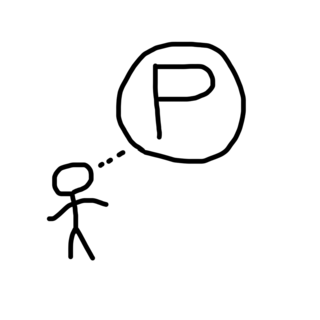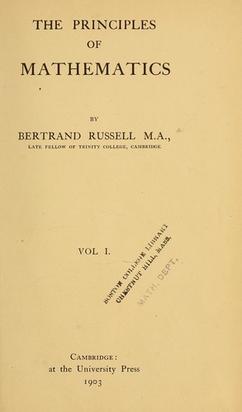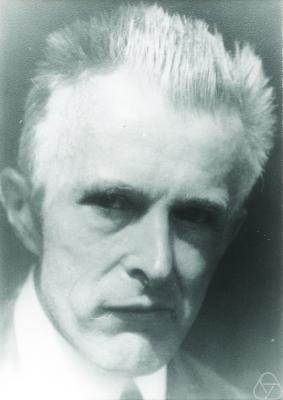
Bertrand Arthur William Russell, 3rd Earl Russell, was a British mathematician, philosopher, logician, and public intellectual. He had a considerable influence on mathematics, logic, set theory, linguistics, artificial intelligence, cognitive science, computer science and various areas of analytic philosophy, especially philosophy of mathematics, philosophy of language, epistemology, and metaphysics.
In the philosophy of mathematics, intuitionism, or neointuitionism, is an approach where mathematics is considered to be purely the result of the constructive mental activity of humans rather than the discovery of fundamental principles claimed to exist in an objective reality. That is, logic and mathematics are not considered analytic activities wherein deep properties of objective reality are revealed and applied, but are instead considered the application of internally consistent methods used to realize more complex mental constructs, regardless of their possible independent existence in an objective reality.
Mathematical logic is the study of formal logic within mathematics. Major subareas include model theory, proof theory, set theory, and recursion theory. Research in mathematical logic commonly addresses the mathematical properties of formal systems of logic such as their expressive or deductive power. However, it can also include uses of logic to characterize correct mathematical reasoning or to establish foundations of mathematics.

In mathematical logic, Russell's paradox is a set-theoretic paradox published by the British philosopher and mathematician Bertrand Russell in 1901. Russell's paradox shows that every set theory that contains an unrestricted comprehension principle leads to contradictions. The paradox had already been discovered independently in 1899 by the German mathematician Ernst Zermelo. However, Zermelo did not publish the idea, which remained known only to David Hilbert, Edmund Husserl, and other academics at the University of Göttingen. At the end of the 1890s, Georg Cantor – considered the founder of modern set theory – had already realized that his theory would lead to a contradiction, as he told Hilbert and Richard Dedekind by letter.

Friedrich Ludwig Gottlob Frege was a German philosopher, logician, and mathematician. He was a mathematics professor at the University of Jena, and is understood by many to be the father of analytic philosophy, concentrating on the philosophy of language, logic, and mathematics. Though he was largely ignored during his lifetime, Giuseppe Peano (1858–1932), Bertrand Russell (1872–1970), and, to some extent, Ludwig Wittgenstein (1889–1951) introduced his work to later generations of philosophers. Frege is widely considered to be the greatest logician since Aristotle, and one of the most profound philosophers of mathematics ever.

Analytic philosophy is a branch and tradition of philosophy using analysis, popular in the Western world and particularly the Anglosphere, which began around the turn of the 20th century in the contemporary era in the United Kingdom, United States, Canada, Australia, New Zealand, and Scandinavia, and continues today. Analytic philosophy is often contrasted with continental philosophy, coined as a catch-all term for other methods, prominent in Europe.
In mathematics, a binary relation R on a set X is reflexive if it relates every element of X to itself.

A propositional attitude is a mental state held by an agent or organism toward a proposition.

Bernard Bosanquet was an English philosopher and political theorist, and an influential figure on matters of political and social policy in the late 19th and early 20th centuries. His work influenced but was later subject to criticism by many thinkers, notably Bertrand Russell, John Dewey, William James and Ludwig Wittgenstein. Bernard was the husband of Helen Bosanquet, the leader of the Charity Organisation Society.

Logical atomism is a philosophical view that originated in the early 20th century with the development of analytic philosophy. It holds that the world consists of ultimate logical "facts" that cannot be broken down any further, each of which can be understood independently of other facts.

Ivor Owen Grattan-Guinness was a historian of mathematics and logic.
The Muirhead Library of Philosophy was an influential series which published some of the best writings of twentieth century philosophy. The original programme was drawn up by John Muirhead and published in Erdmann's History of Philosophy in 1890. This statement was published in slightly altered form in subsequent volumes:

James Opie Urmson, was a philosopher and classicist who spent most of his professional career at Corpus Christi College, Oxford. He was a prolific author and expert on a number of topics including British analytic/linguistic philosophy, George Berkeley, ethics, and Greek philosophy.

The Principles of Mathematics (PoM) is a 1903 book by Bertrand Russell, in which the author presented his famous paradox and argued his thesis that mathematics and logic are identical.

The aspects of Bertrand Russell's views on philosophy cover the changing viewpoints of philosopher and mathematician Bertrand Russell (1872–1970), from his early writings in 1896 until his death in February 1970.

Aspects of philosopher, mathematician and social activist Bertrand Russell's views on society changed over nearly 80 years of prolific writing, beginning with his early work in 1896, until his death in February 1970.
Mathematics has no generally accepted definition. Different schools of thought, particularly in philosophy, have put forth radically different definitions. All proposed definitions are controversial in their own ways.

British philosophy refers to the philosophical tradition of the British people. "The native characteristics of British philosophy are these: common sense, dislike of complication, a strong preference for the concrete over the abstract and a certain awkward honesty of method in which an occasional pearl of poetry is embedded".
Relations are ways in which things, the relata, stand to each other. Relations are in many ways similar to properties in that both characterize the things they apply to. Properties are sometimes treated as a special case of relations involving only one relatum. In philosophy, theories of relations are typically introduced to account for repetitions of how several things stand to each other.

Heinrich Scholz was a German logician, philosopher, and Protestant theologian. He was a peer of Alan Turing who mentioned Scholz when writing with regard to the reception of "On Computable Numbers, with an Application to the Entscheidungsproblem": "I have had two letters asking for reprints, one from Braithwaite at King's and one from a professor [sic] in Germany... They seemed very much interested in the paper. [...] I was disappointed by its reception here."











